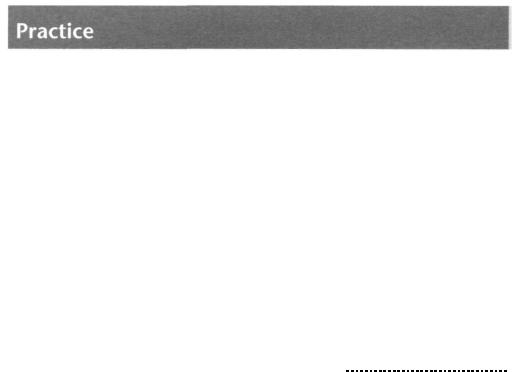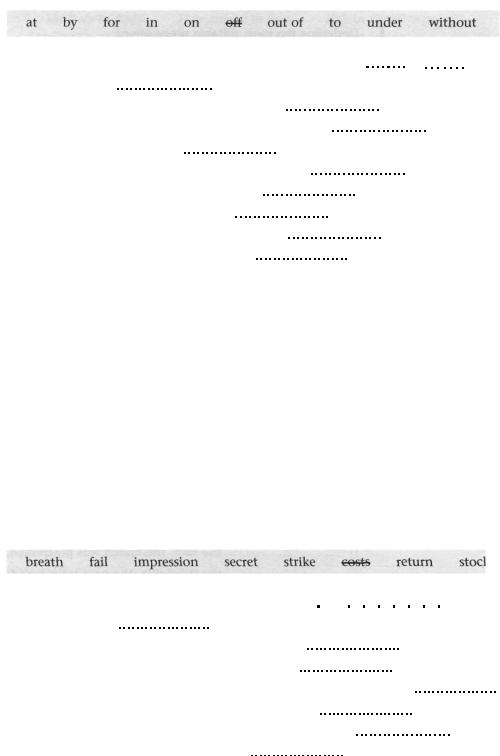
English_books / MacMillan-FCE.Language.Practice.With.Key(M.Vince) nen in
.pdfG R A M M A R 1 1 R E L A T V E CLAUSES
Which, who and |
• |
That instead of which |
|
|
that |
|
When we talk about things, that is often used instead of which. This is very |
||
|
|
common in speech. |
|
|
|
|
Is this the house that you bought? |
|
|
|
- That instead |
of who |
|
|
|
|
When we talk about people, that can be used instead of who. This is less |
||
|
|
common, but we still do it, especially in speech. |
|
|
|
|
Have you met the boy that Sue is going to marry? |
|
|
|
• Which in non-defining clauses |
|
||
|
|
That cannot be used to introduce a non-defining clause. |
||
|
|
The hotel, which was a hundred years old, was very comfortable. |
||
|
• |
Prepositions |
|
|
|
|
That cannot be used after a preposition. |
|
|
|
|
This is the car (that/which) I paid £2000 for. |
(speech) |
|
|
|
This is |
the car for which I paid £2000. |
(formal) |
Whom and whose |
- |
Whom is the object form of who. It has to be used after prepositions. Its use is |
|
|
|
formal and quite rare. |
|
|
|
This is the person (who) I sold my car to. |
(speech) |
|
|
This is the person to whom I sold my car. |
(formal) |
• Whose means of whom, and usually refers to people.
This is Jack. His sister is staying with us. This is Jack, whose sister is staying with us.
6.i

FIRST CERTIFICATE LANGUAGE PRACTICE
Underline any relative pronouns that can be left out in these sentences.
a)I think that my boss is the person who I admire most.
b)Harry, who was tired, went to bed very early.
c)We're taking the train that leaves at 6.00.
d)Have you seen the book that I left here on the desk?
e)The film which we liked most was the French one.
f)My radio, which isn't very old, has suddenly stopped working.
g)The clothes which you left behind are at the reception desk.
h)The couple who met me at the station took me out to dinner.
i)Last week I ran into an old friend who I hadn't seen for ages.
j)Don't cook the meat that I put in the freezer - it's for the dog.
2 Replace the relative pronouns in italics with that, where possible.
a) This is the magazine which I told you about.
.This is the magazine that I told you about.
b)John's flat, which is in the same block as mine, is much larger.
c)The girl whose bag I offered to carry turned out to be an old friend.
d)The policeman who arrested her had recognised her car.
e)I work with someone who knows you.
f)We don't sell goods which have been damaged.
g)Brighton, which is on the south coast, is a popular holiday resort.
h)I don't know anyone whose clothes would fit you.
i)There's a cafe near here which serves very good meals.
j)People who park outside get given parking tickets.
64

G R A M M A R 11 RELATIVE CLAUSES
3Underline the most suitable word in each sentence.
a)My friend Jack, that/who/ whose parents live in Glasgow, invited me to spend Christmas in Scotland.
b)Here's the computer program that/whom/whose I told you about.
c)I don't believe the story that/who/whom she told us.
d)Peter comes from Witney, that/who/which is near Oxford.
e)This is the gun with that/whom/which the murder was committed.
f)Have you received the parcel whom/whose/which we sent you?
g)Is this the person who/which/whose you asked me about?
h)That's the girl that/who/whose brother sits next to me at school.
i)The meal, that/which/whose wasn't very tasty, was quite expensive.
j)We didn't enjoy the play that/who/whose we went to see.
4Put a suitable relative pronoun in each space, or leave the space blank where possible.
a) |
My bike, |
which.... |
I had left at the gate, had disappeared. |
|
b) |
The shoes |
|
I bought were the ones |
I tried on first. |
c) |
The bag in |
|
the robbers put the money was found later. |
|
d) |
The medicine |
the doctor gave me had no effect at all. |
||
e) |
Peter, |
couldn't see the screen, decided to change his seat. |
||
f) |
I really liked that tea |
you made me this morning. |
||
g) What was the name of your friend |
tent we borrowed? |
|||
h) |
The flight |
|
Joe was leaving on was cancelled. |
|
5Make one new sentence from each pair of sentences. Begin as shown, and use the word given in capitals.
a) Brenda is a friend. I went on holiday with her. |
WHO |
Brendais ..the friend who I went on holiday with.
b) |
This is Mr Smith. His son Bill plays in our team. |
WHOSE |
|
This is Mr Smith |
|
c) |
Her book was published last year. It became a best seller. |
WHICH |
|
Her book |
|
d) This is the bank. We borrowed the money from it. |
WHICH |
|
|
This is the bank from |
|
e) |
I told you about a person. She is at the door. |
WHO |
|
The person |
|
f) |
Jack's car had broken down. He had to take a bus. |
WHOSE |
|
Jack, |
|
65

FIRST CERTIFICATE LANGUAGE PRACTICE
6Make one sentence from each group of sentences, beginning as shown.
a)The hotel was full of guests. The hotel was miles from anywhere. The guests had gone there to admire the scenery.
The hotel, which was miles from anywhere, was full of guests
.who had gone there to admire the scenery
b)I lent you a book. It was written by a friend of mine. She lives in France. The book I
c)A woman's jewels were stolen. A police officer was staying in the same hotel. The woman was interviewed by him.
The woman whose
d)A goal was scored by a teenager. He had come on as substitute. This goal won the match.
The goal which
e)I was sitting next to a boy in the exam. He told me the answers. The boy I
f)My wallet contained over £100. It was found in the street by a schoolboy. He returned it.
My wallet,
g)My friend Albert has decided to buy a motorbike. His car was stolen last week. My friend Albert,
h)Carol is a vegetarian. I cooked a meal for her last week. She enjoyed it. Carol,
7 Put one suitable word in each space, or leave the space blank where possible.
Murder At The Station by Lorraine Small. Episode 5. Trouble on the 6.15. The story
so far: Jane Platt, (1) |
who |
is travelling to London because of a |
|
mysterious letter, is the only person (2) |
witnesses a murder at |
||
Victoria Station. The detective to (3) |
she gives her statement then |
||
disappears. Jane goes to an office in Soho to answer the letter (4) she had received. There she discovers that her uncle Gordon, (5)

G R A M M A R 11 RELATIVE CLAUSES
lives in South America, has sent her a small box (6) |
|
she is only to |
||
open if in trouble. Jane, (7) |
parents have never mentioned an |
|||
Uncle Gordon, is suspicious of the box, (8) |
she gives to her friend |
|||
Tony. They go to Scotland Yard and see Inspector Groves, (9) |
has |
|||
not heard of the Victoria Station murder, (10) |
was not reported to |
|||
the police. Jane gives Inspector Groves the murdered man's ticket |
||||
(11) |
she found beside his body. Then Jane and Tony decide to go |
|||
to Redhill, (12) |
was the town (13) |
|
the murdered man |
|
had come from. On the train they meet a man, (14) |
|
face is |
||
somehow familiar to Jane, (15) |
says he knows her Uncle Gordon... |
|||
8These sentences are all grammatically possible, but not appropriate in speech. Rewrite each sentence so that it ends with the preposition in italics.
a)Margaret is the girl with whom I went on holiday.
b)The golf club is the only club of which I am a member.
c)That's the girl about whom we were talking.
d)It was a wonderful present, for which I was extremely grateful.
e)This is the school to which I used to go.
f)Is this the case in which we should put the wine glasses?
g)Can you move the chair on which you are sitting?
h)That's the shop from which I got my shoes.
i)Is that the person next to whom you usually sit?
j)This is Bill, about whom you have heard so much.
67

FIRST CERTIFICATE LANGUAGE PRACTICE
9 Make one sentence from each group of sentences, beginning as shown.
a) I got on a train. I wanted to go to a station. The train didn't stop there.
The train I .got on didn't stop at the station I wanted to go to..
b)I read a book. You recommended a book to me. This was the book. The book I
c)The ship hit an iceberg and sank. Warning messages had been sent to it. The ship ignored these.
The ship,
d)The postman realised I was on holiday. You had sent me a parcel. The postman left it next door.
The postman,
e)I used to own a dog. People came to the door. The dog never barked at them. The dog I
f)I bought my car from a woman. She lives in a house. You can see the house over there.
The woman I
g)We went to a beach on the first day of our holiday. It was covered in seaweed. This smelled a lot.
The beach we
h)My neighbours have three small children. The children make a lot of noise. My neighbours never apologise.
My neighbours,
i)I bought a new computer. It cost me a lot of money.
|
|
The new |
|
|
|
|
|
Key points |
1 |
Long sentences with relative clauses are more common in writing. In speech it |
|||||
|
|
is more usual to join shorter clauses with conjunctions. |
|
|
|
||
|
|
The hotel, which was miles from anywhere, was full of guests. (writing) |
|||||
|
|
The |
hotel |
was miles from anywhere. It was full |
of |
guests. |
(speech) |
|
|
The |
hotel |
was miles from anywhere, and it was full |
of |
guests. |
(speech) |
2In speech, relative pronouns are usually left out when they are the object of the clause.
This is the hook I told you about.
3In speech it is common to end relative clauses with a preposition.
That's the girl I live next door to.

Explanations
Movement |
Prepositions used with verbs of motion (come, go, run, etc) show the direction of |
|||||
|
the movement. |
|
|
|
|
|
|
Jack ran out of the room. |
Sue moved towards the door. |
||||
|
Other examples: to, into, across, around, along, up, down, past |
|||||
Position and place |
Prepositions can show position. |
|
|
|||
|
Ted was sitting next to Janet. |
The bank is opposite the cinema. |
||||
|
Other examples: before, below, beside, in front of, near, on top of, under |
|||||
|
Prepositions can show place. |
|
|
|||
|
/ live in France. |
Sue lives on an island. |
John is at school. |
|||
|
See below for problems of use. |
|
|
|||
Other uses |
• Prepositions are also used in time expressions. |
|
||||
|
• Prepositions cover a wide range of other meanings. |
|||||
|
This book is |
about Napoleon. |
|
|
||
|
I can't drink |
tea |
with/without |
sugar. |
|
|
Problems of use |
• To and at |
|
|
|
|
|
|
With verbs of motion to means in the direction of. At is not used with verbs of |
|||||
|
motion. It is used to say where someone or something is. |
|||||
|
We went to the cinema. |
We arrived at the cinema. |
||||
|
- Next to and near |
|
|
|
|
|
|
Next to means very close, with nothing in between. It is the same as beside. Near |
|||||
|
means only a short distance from, which can be a matter of opinion. |
|||||
|
Peter always sits next to Mary. |
|
|
|||
|
I live near the sea, |
it's |
only ten |
miles away. |
|
|
•Above and over
Both words mean in a higher position than, but over suggests closeness or touching.
There was a plane high above them. Put this blanket over you.
There may be little difference in some contexts.
There was something written above/over the door.
69
FIRST CERTIFICATE LANGUAGE PRACTICE
|
• In and at: places |
|
|
|
|
In refers to towns, countries and the 'inside' of places. |
|||
|
She lives in Paris. |
They arrived in Peru. |
He's in the kitchen. |
|
|
At refers to points with a particular purpose rather than inside. |
|||
|
She lives at home. |
I'll meet you at the bus stop. |
||
|
Compare: |
|
|
|
|
They met in the cinema. (inside) |
|
|
|
|
They met at the |
cinema. (place) |
|
|
|
• Prepositions at the end of a sentence |
|
|
|
|
Study these common examples: |
|
|
|
|
Who are you waiting for? |
(question) |
|
|
|
You are very difficult to live with! |
(infinitive) |
|
|
|
That's the company that I work for. |
(relative clause) |
||
Prepositions |
Some prepositions can be used without an object. |
|
||
without an object |
Ted was walking along, whistling. |
|
|
|
|
In this example we mean along the street, but it is clear from the context or |
|||
|
unimportant. |
|
|
|
|
Other prepositions used like this are: around, along, behind, opposite |
|||
Prepositions with |
Examples: according to, |
on behalf of, by means of |
|
|
more than one word Other examples are included in the Practice section. |
|
|||
Prepositional |
There are many fixed phrases containing prepositions. |
|||
phrases |
Examples: by mistake, on purpose, out of order |
|
||
|
Other examples are included in the Practice section. |
|
||
70

G R A M M A R 1 2 P R E P O S I T I O N S
Underline the most suitable prepositions.
a)I got at/to the station just in time to see Jack getting from/off'the train.
b)The cafe is among/between the chemist's and the butcher's and across/opposite the library.
c)Sue lives at/in Wales, which is a country at/in the west of Britain.
d)I was brought up in/on an island near/next to the coast of Scotland.
e)Travelling by/in your own car is better than going by/on foot.
f)Jack was leaning by/against the wall with his hands in/into his pockets.
g)Ann had a hat on/over her head and a veil above/over her face.
h)We arrived at/in England at/in Gatwick Airport.
i)I left my bags at/from the station at/in a left luggage locker.
j)Peter came running into/to the room and threw his books at/onto the floor.
2 Complete each sentence with a suitable word or phrase from the box.
a) |
I think I'd rather have coffee |
instead |
of..... tea. |
b) |
the danger, Paul ran back into the burning house. |
||
c) |
fire, smash the glass and push the button. |
||
d) |
Personally, I am |
banning cigarette smoking completely! |
|
e) |
I would like to thank you, |
|
everyone who was rescued. |
f) |
you, no-one else knows that I have escaped. |
||
g) |
Steve, he believes that we should stay where we are. |
||
h) Jim managed to climb into the house |
a ladder he found. |
||
i) |
the rain, the match was postponed. |
||
j) |
the timetable, the next train isn't for two hours. |
||
3Decide whether it is possible to leave out the words in italics.
a)Most people are wandering around the streets, taking photos. ...possible
b)I gave my bike to my little sister, when it became too small for me
c)The people who live in the house opposite our house are Italian
d)I left my coat on the bed in here but it seems to have disappeared
e)I'll wait for you outside the cinema, on the pavement
f)Peter took a deep breath, and then went under the water again
g)Don't worry, the hotel's quite near to where we are now
h)The children can sit behind you in the back seats
71

FIRST CERTIFICATE LANGUAGE PRACTICE
4 Complete each sentence with a suitable word or phrase from the box.
a) |
Police officers don't have to wear uniform when they are |
off. |
duty. |
|||
b) |
I feel very tired |
times I consider giving up work. |
|
|||
c) |
The children were all upset, and some were |
|
tears. |
|
||
d) |
This factory needs modernising. Everything here is |
|
date. |
|
||
e) |
Don't worry, everything is |
|
control. |
|
|
|
f) |
Sorry, I seem to have taken the wrong umbrella |
|
mistake. |
|
||
g) |
Please hurry. We need these documents |
|
delay. |
|
||
h) |
That wasn't an accident! You did it |
purpose. |
|
|
||
i) |
We thought the two films were very similar |
|
each other. |
|
||
j) |
We decided to take a holiday in Wales |
|
a change. |
|
||
5Underline the most suitable phrase in each sentence.
a)I can't disturb John now. He's at bed/in bed.
b)Tony always arrives exactly in time/on time for his lesson.
c)Two pounds for each ticket, that makes £12 in all/with all.
d) I can't pick that last apple. It's out of hand/out of reach.
e)Joe and I met on the plane completely by chance/by surprise.
f)The children spend most of their time out of doors/out of place.
g) I'm sorry but Jane isn't here at present/at a time.
h)How can Sam love Lucy? They have nothing in common/in general.
i)They should be here soon. They are in the way/on the way.
j)Terry isn't here. He's away in business/on business.
6 Complete each sentence with a suitable word from the box.
k
a) This is important. You must catch the two men at all costs
b) I was under the that you enjoyed working here.
c)Please hand your work in on Tuesday, without
d)We can't go by train. The train-drivers are on
e)Martin is supposed to have given up smoking, but he smokes in
f)I'm afraid we don't have your size, we are out of
g) |
If I give you the information, what will you give me in |
? |
h) |
I ran for the bus, and now I'm out of |
|
72
